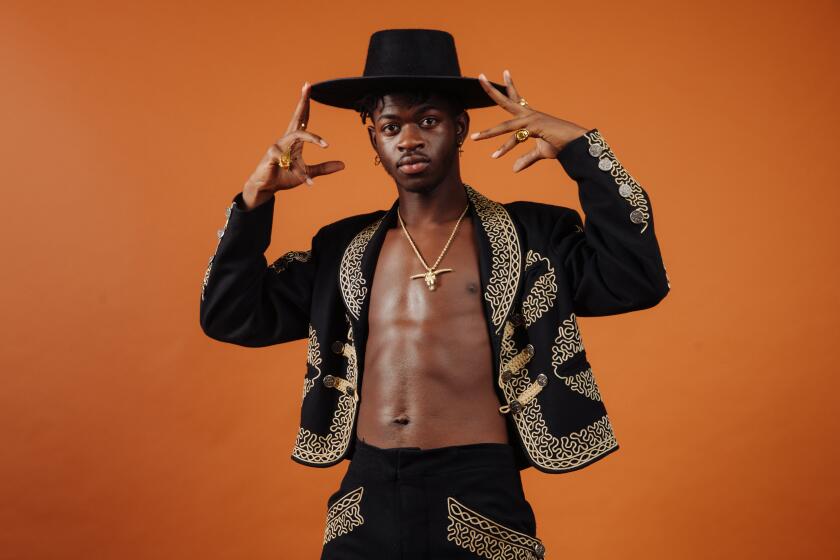The (retro) future is his
- Share via
Just because hip-hop/R&B; star T-Pain single-handedly -- albeit accidentally -- transformed the pop chart with his retro-futuristic sound, don’t expect him to strangle the goose that laid the golden egg.
That is to say, he isn’t going to stop using a voice-distorting computer program called Auto-Tune any time soon. Not after employing the technology to create two hit albums and land a whopping 27 songs on the pop chart since 2005, most of them in collaboration with the multi-platinum-selling likes of R. Kelly, T.I., Rick Ross and Akon.
Nor is T-Pain troubled by the fact that a constellation of rap stars -- including Snoop Dogg on “Sensual Seduction,” G-Unit on “Rider Pt. 2” and Lil Wayne on his No. 1 hit “Lollipop” -- also have used the effect, which manipulates vocal pitch to “correct” a note in a scale, resulting in a heavily processed sound perhaps best described as robot lust.
As the rapper-turned-singer sees it, if continuing fealty to computer vocal tweaking means he has to suffer the occasional sling or arrow from his record label, Konvict/Jive, so be it. To the chagrin of some label artist-and-repertoire honchos, about half the songs on his new album “Thr33 Ringz,” which hit retail Tuesday, use Auto-Tune.
“Recently, I got some [flak] for it,” T-Pain said by phone from Atlanta, where he was in the middle of moving into a new house. “They said I should stop doing [Auto-Tune] because too many other people are using it now. They figured that people would get tired of it. What I explained to them is, there’s no one better than the originator.”
The top-hat-loving Grammy winner places his innovation within a larger continuum of musical FX technicians who inspired him. He pointed out that Teddy Riley, one of the fathers of New Jack Swing, and Roger Troutman, a ‘70s funk-R&B; legend, used an earlier funky-voice technology called the Vocoder to distinguish themselves and achieve chart success. (In 1998, Cher recorded the electro-tinged romantic paean “Believe,” which is widely credited with injecting Auto-Tune’s mechanical modulations into pop consciousness.)
“Teddy Riley can’t do it better than Roger Troutman,” T-Pain said. “I can’t do it better than Teddy Riley. And can’t nobody do it better than me. So whoever come after me have to bring it!”
A former member of the Tallahassee rap group Nappy Headz whose solo output largely has cohered around temporal pleasures -- as evidenced by songs such as “Buy U a Drank (Shawty Snappin’),” “I’m N Luv (Wit a Stripper)” and “Bartender” -- T-Pain, 23, said he first heard Auto-Tune on a song by Jennifer Lopez, though he can’t recall the title, and used the effect for his contribution to a 2003 mix tape.
Around that time, he had been experimenting with other pitch-shifting technologies he remembered as “a bunch of weird stuff where people would have thought I was an alien.”
“As I was ending my rap career, I was thinking about switching to singing full time,” T-Pain said. “If I was going to sing, I didn’t want to sound like everybody else. . . . I just wanted something to make me different. Auto-Tune was the one. So I just stuck with that effect.”
Ironically, T-Pain’s efforts to stand out from the pack have resulted in hip-hop’s new normal. Earlier this year the singer-producer traveled to Hawaii to give Kanye West a crash course in using Auto-Tune. And now the effect turns up on every song on the Louis Vuitton Don’s upcoming album “808s & Heartbreak” -- a paradigm shift for a performer known for his clear, enunciative rap style.
“Auto-Tune. That’s like the new word that represents wack,” West said at a listening party for his album last month. “But it’s the funnest thing to use.” He added of his collaborator: “When T-Pain came to Hawaii, his energy was just so pure, so untampered with. His light was so bright.”
Although T-Pain doesn’t begrudge other top-tier performers who want to dip their beaks into the Auto-Tune pond (indeed, he has enough of a sense of humor about his reliance on the technology to make a digital film for funnyordie.com about it), he takes exception with hip-hop Johnny-come-latelies who use the technology as a stand-in for creativity.
“Imitation is the best form of flattery only when it’s huge people doing it,” T-Pain said. “People like Snoop, Kanye and people like that. But when it’s some dude trying to get a record deal, it’s like, ‘Come on, man!’ People think that’s the thing that’s going to get them a deal. It’s like, come on people, you still gotta write a song!”
--
More to Read
The biggest entertainment stories
Get our big stories about Hollywood, film, television, music, arts, culture and more right in your inbox as soon as they publish.
You may occasionally receive promotional content from the Los Angeles Times.











